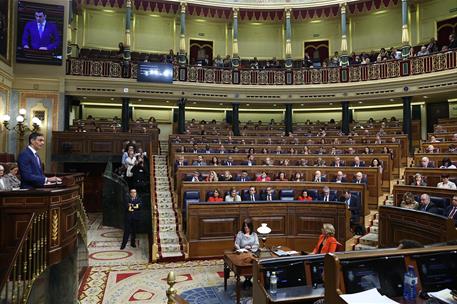The Government of Spain strengthens the oversight and innovation of the electricity system
Council of Ministers - 2025.6.24
Moncloa Palace, Madrid
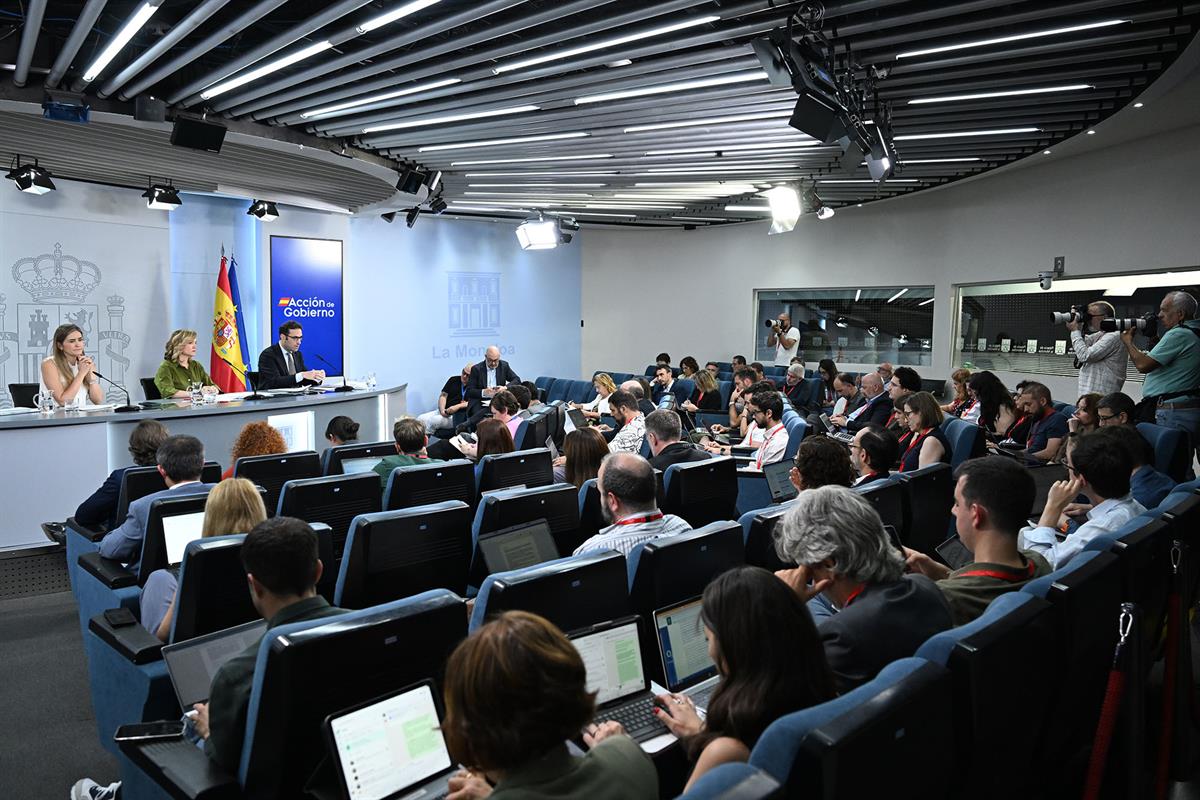 Pool Moncloa/Borja Puig de la Bellacasa
Pool Moncloa/Borja Puig de la Bellacasa
The Council of Ministers has agreed on three highly relevant actions within the scope of the Ministry of Ecological Transition and Demographic Challenge: the reinforcement of the electricity system, the granting of aid for the transmission grid and the protection of marine areas.
Reinforcement of the electricity system
The Government has approved a set of urgent measures to strengthen the electricity system, meeting the commitment made after the blackout of 28 April and the announcement made last week at the presentation of the report on the causes of the electricity crisis.
The objective, as explained by the Third Vice-President of the Government of Spain and Minister for Ecological Transition and Demographic Challenge, Sara Aagesen, is to increase the resilience of the system in a complicated geopolitical context so that it is more robust, innovative and sustainable and offers more stable bills to citizens, the self-employed, SMEs and industry. "In short, more strategic autonomy in a complex, uncertain and volatile world," she said.
The royal decree law approved today is divided into three main blocks. The first seeks to strengthen the oversight, verification, compliance and transfer of the system, as well as to strengthen the monitoring and damping capabilities of the system.
The minister has argued that on 28 April all the necessary elements were in place to control the voltage in the system, but either they were not programmed to the appropriate scale or the various actors needed to regulate the voltage did not behave as expected (or a combination of both factors). To prevent such situations, the regulation entrusts the National Markets and Competition Commission with new monitoring and inspection tasks and establishes a work plan and a timetable for the system operator to draw up technical regulation proposals on important aspects for the operation of the system, among other initiatives.
 Pool Moncloa/Borja Puig de la Bellacasa
Pool Moncloa/Borja Puig de la Bellacasa
Enhancing the storage and flexibility of the system is the objective of the second block of measures. According to the vice-president, the regulation favours "hybridisation", i.e. "batteries should be installed in areas where there are already renewable energy parks". Flexibility - the system's capacity for certain subjects and technologies to adapt to changes in energy supply and demand - is promoted by developing figures such as the collective self-consumption manager.
The third block is aimed at advancing the electrification of the system, facilitating the integration of industrial demand, transport and renewable generation. Electricity planning will be carried out every three years, with possible specific modifications every two years, according to Sara Aagesen, who announced that in the coming weeks the Government will begin to meet with the system operator and the autonomous communities in the framework of transmission grid planning.
Investment in the transmission network
The Council of Ministers has also approved a royal decree to invest 931 million euros in the energy transmission network, charged to European funds. The third vice-president pointed out that the priority is strategic decarbonisation projects, which save costs for citizens and promote new industrial projects. The rule speeds up the process for these projects to materialise and prevents inefficient use of networks.
In addition, to protect industry, the text includes an 80% exemption from tolls for electricity intensive consumers for the whole of 2025. It also extends the radius of self-consumption to 5 kilometres for projects of a maximum of 5 megawatts, speeds up the installation of electric vehicle charging infrastructures and makes it easier for homeowners' associations to opt for aerothermal solutions, among other measures.
New marine protected areas
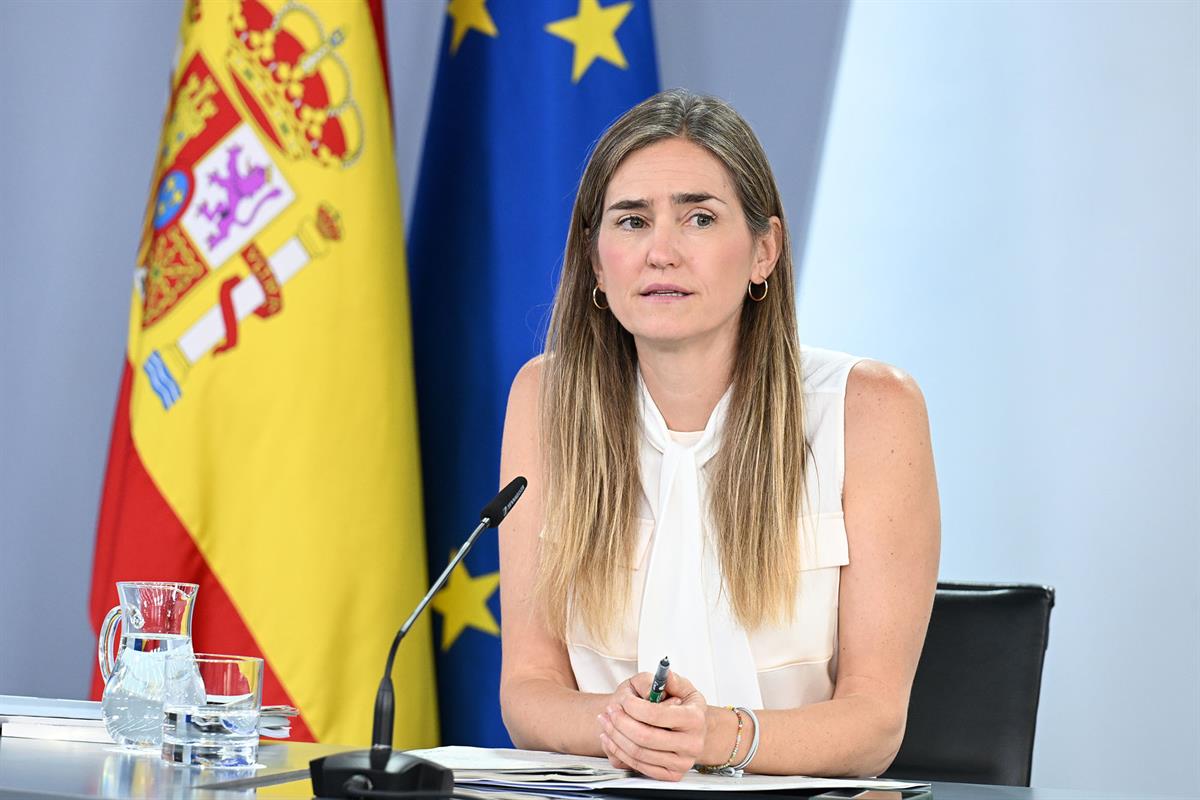 Pool Moncloa/Borja Puig de la Bellacasa
Pool Moncloa/Borja Puig de la Bellacasa
Finally, the Executive has promoted the protection of marine areas through a royal decree that Sara Aagesen has framed within the policies of marine conservation and sustainable development of the coast presented at the recent United Nations Conference on Oceans.
The regulation declares 10 new Special Areas of Conservation (SACs), of which seven are considered Special Protection Areas for Birds (SPAs), in the Mediterranean marine region. In addition, the corresponding management plans are approved to regulate uses and activities in these areas. The vice-president pointed out that Spain currently has 20.9% of its marine area protected, a percentage that will rise to 22.5% with these plans. The target is to reach 25.7% by the end of the year.
Conditional clearance of the merger of BBVA and Sabadell
The Council of Ministers has authorised BBVA's merger with Banco Sabadell, on the condition that, for the next three years, both entities maintain a separate legal personality and assets, as well as autonomy in the management of their activity. In addition, it has confirmed the commitments already set by the National Markets and Competition Commission.
The Minister for Economy, Trade and Business, Carlos Cuerpo, explained that the additional condition established by the Government is based on the protection of five general interest criteria, other than those relating to defending competition, in accordance with what the regulations authorise.
These criteria are to ensure that the objectives of sectoral regulation linked to supporting growth and business activity through, essentially, financing, in particular for SMEs; worker protection; territorial cohesion; social policy objectives, from the social work of foundations to the protection of financial clients and affordable housing; and the promotion of research and technological development, are met.
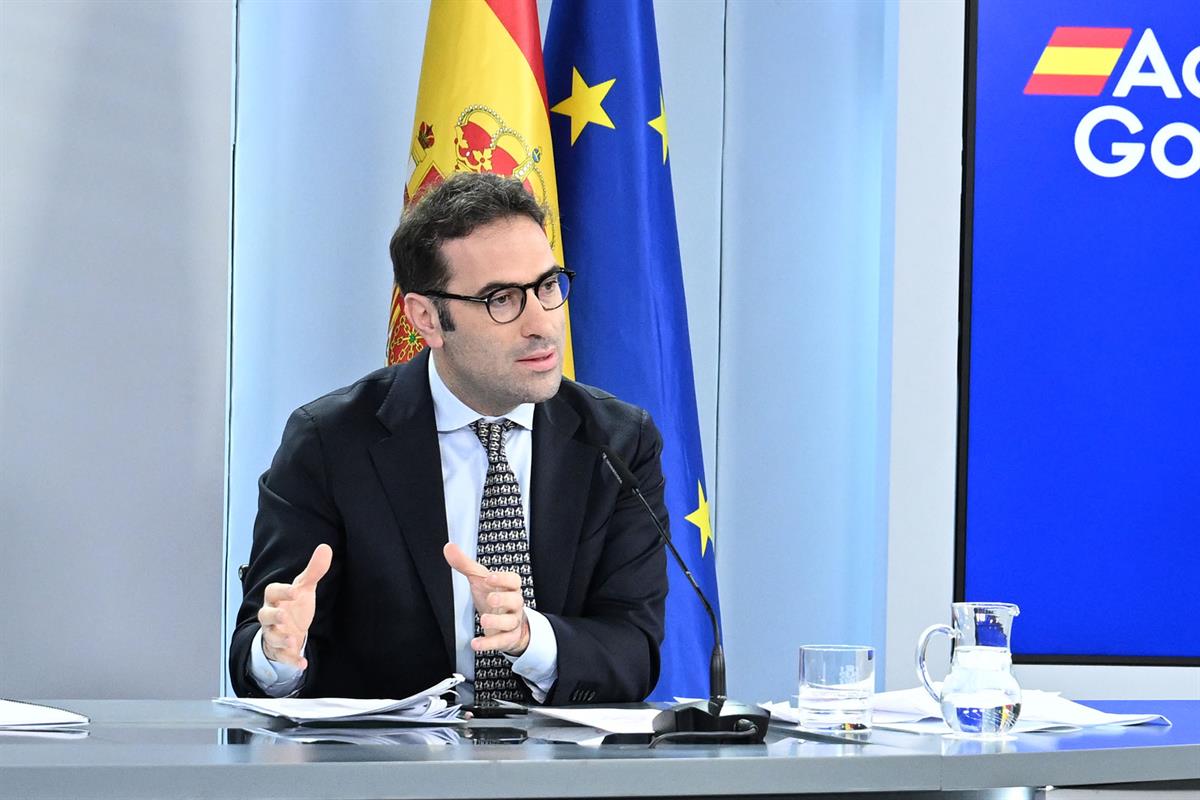 Pool Moncloa/Borja Puig de la Bellacasa
Pool Moncloa/Borja Puig de la Bellacasa
The minister stressed that these are general interest criteria, enacted in our legal system and endorsed by the jurisprudence of the Court of Justice of the European Union.
Regarding management autonomy, Carlos Cuerpo clarified that it implies effective decision-making in at least the following areas: financing and credit; human resources decisions; the branch network and banking services; and social work through the foundations.
In order to assess compliance with the condition, both entities must submit two documents, at the latest six months and at least two months before the three-year deadline: a progress report on how the autonomous management has been carried out and a structural plan detailing the extent to which the entities' corporate strategy will affect the general interest criteria in the following years. Once the status has been assessed, the Council of Ministers will determine whether to extend its duration for a further two years.
The Minister for Economy stressed the "element of proportionality and balance" in the condition imposed on the operation, "which has a finalist approach, seeking at all times to protect the general interest criteria, in line with our regulatory framework and our legal system".
LGBTI Pride Celebration
The Council of Ministers has approved an institutional declaration on the occasion of National LGBTI Pride Day, which is celebrated on 28 June. The Minister for Education, Vocational Training and Sports and Government Spokesperson, Pilar Alegría, stressed that the text highlights the diversity of sexual orientation in Spain.
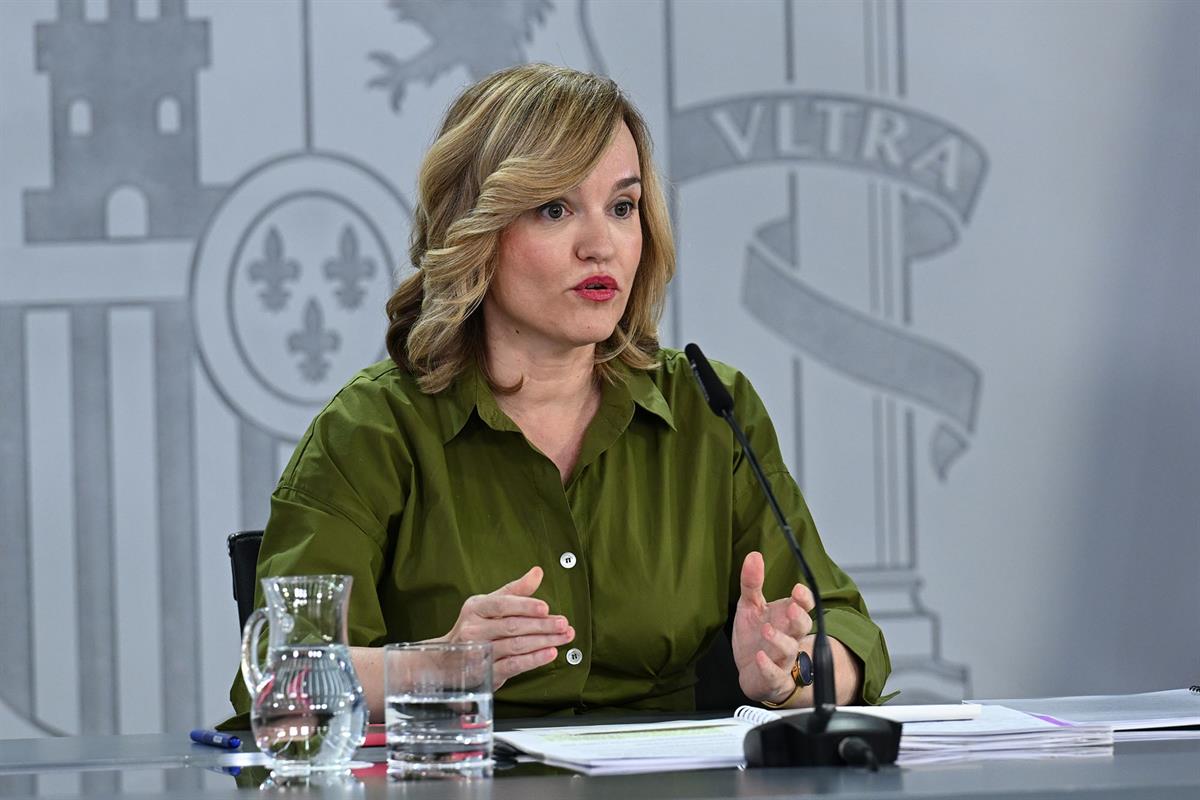 Pool Moncloa/Borja Puig de la Bellacasa
Pool Moncloa/Borja Puig de la Bellacasa
The declaration, she added, coincides with 50 years of democracy, 20 years since the approval of the approval of equal marriage and 10 years since the death of Pedro Zerolo, "a tireless fighter for civil rights". Precisely, the Council of Ministers has awarded the Grand Cross of the Order of San Raimundo de Peñafort to the architect of the law on equal marriage, José Luis Rodríguez Zapatero, and to Pedro Zerolo.
Other agreements of the Council of Ministers
The Executive has declared the territories of Aragon, the Balearic Islands, Castila y Leon, the Canary Islands, Catalonia, La Rioja, the Community of Valencia, Galicia, Andalusia and Castila-La Mancha as areas affected by civil protection emergencies, due to events that occurred between 25 March and 22 June. Pilar Alegría recalled that this declaration facilitates the granting of a series of aid measures for personal damage to homes or municipal infrastructures.
In addition, the Council of Ministers has approved an agreement on the incorporation into the Spanish university system of third-country students from the United States. The government spokesperson has framed this measure within the plans to attract talent to Spain.
Current issues: President's agenda
 Pool Moncloa/Borja Puig de la Bellacasa
Pool Moncloa/Borja Puig de la Bellacasa
Pilar Alegría highlighted the international nature of the president of the Government of Spain's agenda for this week, who this afternoon travels to the Netherlands to take part in the NATO Summit. "A meeting of great importance that comes, moreover, in a very complex geopolitical context and in which Spain, once again, will demonstrate its commitment as a reliable partner, as well as contributing to the indispensable unity in the face of possible threats," she assured.
The spokesperson explained that the head of the Executive will also travel to Brussels tomorrow to take part in the Global Summit for the Future organised by the Vaccine Alliance, the Gates Foundation and the European Union. While there, Pedro Sánchez will participate in the European Council on Thursday.
Spain, for its part, will host next week's International Conference on Financing for Development, which takes place from 30 June to 3 July in Seville.
Non official translation





